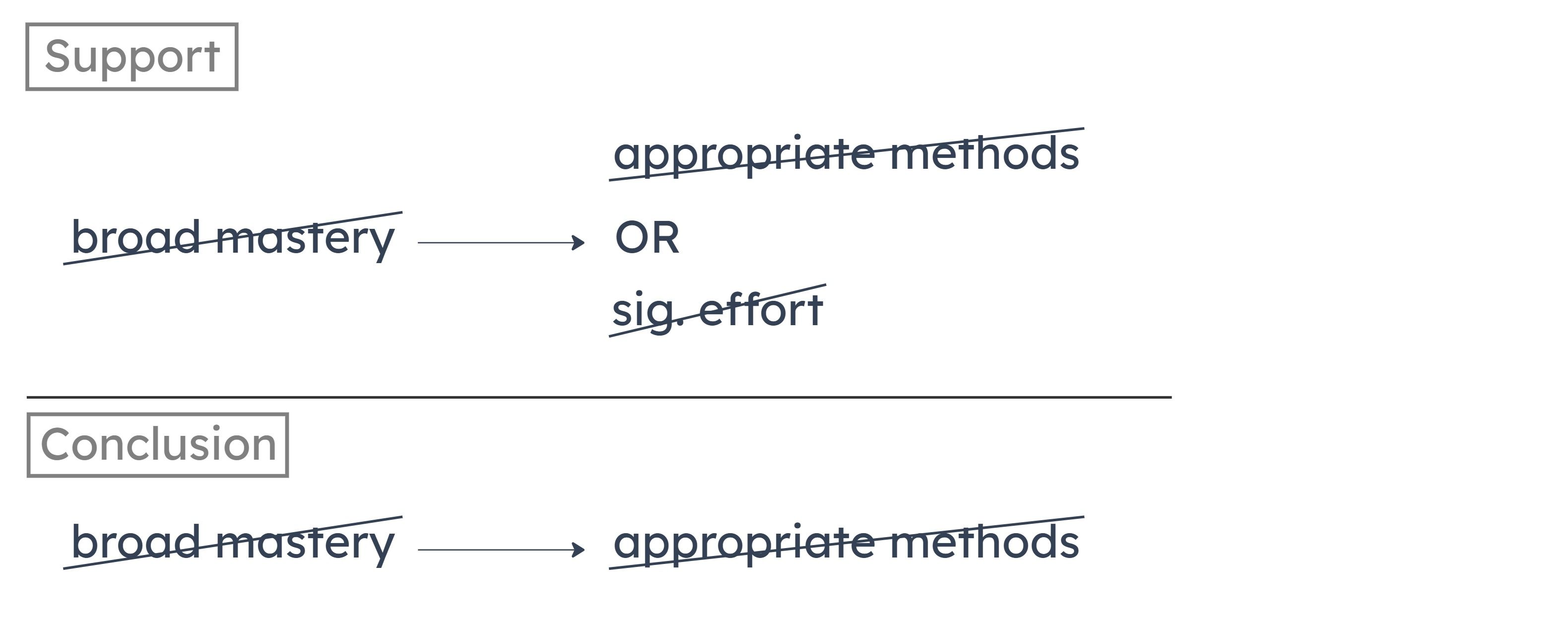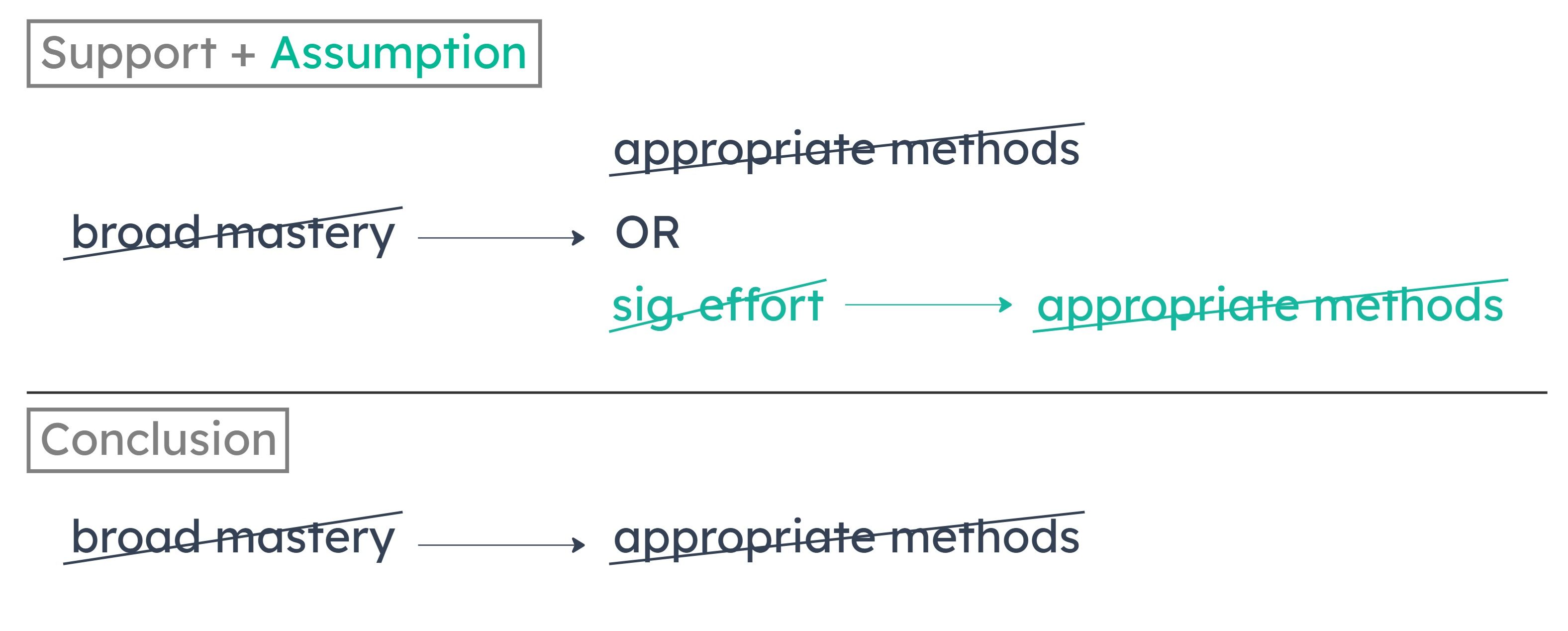
No home appliance can be returned for a refund
Every piece of gardening equipment can be returned for store credit
No piece of gardening equipment can be returned for a refund
Some construction tools can be returned for store credit
Some construction tools cannot be returned for a refund
A
Any item that is not a home appliance or a piece of gardening equipment is returnable for a refund.
B
Any item that is not on sale cannot be returned for store credit.
C
Some construction tools are not returnable for store credit.
D
No piece of gardening equipment is returnable for a refund.

E
None of the things that are returnable for a refund are construction tools.

The conclusion would follow if we assumed that when there’s a lack of significant effort, there must also be a lack of appropriate methods. In that case, no matter what, a lack of broad mastery always means a lack of appropriate methods.
A
As long as secondary school students are taught with methods appropriate to their learning styles, they will devote significant effort to their studies.

B
Even if secondary school students are taught with methods appropriate to their learning styles, they will not achieve broad mastery of the curriculum if they do not devote significant effort to their studies.
C
Secondary school students do not achieve broad mastery of the curriculum if they are not taught with methods appropriate to their learning styles.
D
Teaching secondary school students with methods appropriate to their learning styles does not always result in broad mastery of the curriculum by those students.
E
Secondary school students who devote significant effort to their studies do not always achieve broad mastery of the curriculum.
A
It is used to support the conclusion that people should live in large cities.
B
It is a statement offered to call into question the claim that large cities are generally more polluted than the countryside.
C
It is a statement serving merely to introduce the topic to be addressed in the argument and plays no logical role.
D
It is a premise offered in support of the conclusion that large cities are generally more polluted than the countryside.
E
It is a claim that the rest of the argument is designed to establish.
A science class stored one selection of various fruits at 30 degrees Celsius, a similar selection in similar conditions at 20 degrees, and another similar selection in similar conditions at 10 degrees. Because the fruits stored at 20 degrees stayed fresh longer than those stored at 30 degrees, and those stored at 10 degrees stayed fresh longest, the class concluded that the cooler the temperature at which these varieties of fruits are stored, the longer they will stay fresh.
Summarize Argument
The class concludes that the colder the storage conditions for these fruits, the longer they will stay fresh. They support this with an experiment in which similar fruits were stored at 30, 20, and 10 degrees in similar conditions. The fruits at 20 degrees lasted longer than those at 30 degrees, and the ones at 10 degrees stayed fresh the longest.
Identify and Describe Flaw
The class’s reasoning is flawed because they draw a broad conclusion based on a small range of temperatures (10-30 degrees). They assume that colder storage always keeps the fruits fresh for longer, ignoring the possibility that there could be temperatures that are too cold. In other words, just because the fruits lasted longer at 10 degrees than at 30 doesn’t mean they’ll last longer at 0 degrees.
A
generalized too readily from the fruits it tested to fruits it did not test
This is the cookie-cutter flaw of hasty generalization. The class doesn't make a generalization about fruits that they did not test. Instead, they draw a conclusion about “these varieties of fruits,” meaning the fruits that they did test.
B
ignored the effects of other factors such as humidity and sunlight on the rate of spoilage
The class doesn’t mention other factors, but it doesn’t need to because the experiment controlled for them. By keeping the other conditions similar for each selection of fruits, the class tested the effect of temperature.
C
too readily extrapolated from a narrow range of temperatures to the entire range of temperatures
The experiment showed that within the narrow range of 10-30 degrees, colder storage keeps the fruits fresh longer. They then apply this to all temperatures, assuming that colder storage always works, without considering that some temperatures might be too cold.
D
assumed without proof that its thermometer was reliable
The class never mentions a thermometer at all. Even if they did, we have no reason to believe that the thermometer might be unreliable. The flaw in the class’s argument has to do with how they apply their experiment’s findings, not with their thermometer.
E
neglected to offer any explanation for the results it discovered
The class concludes that colder storage helps the fruits last longer; they don't need to explain why. Even if they did explain why, this wouldn’t fix the fact that they apply their results too broadly.